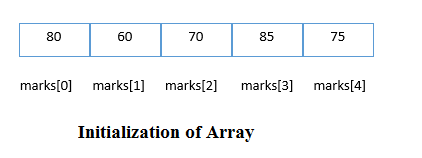C Array
Array in C language is a collection or group of elements (data). All the elements of c array are homogeneous (similar). It has contiguous memory location.
C array is beneficial if you have to store similar elements. Suppose you have to store marks of 50 students, one way to do this is allotting 50 variables. So it will be typical and hard to manage. For example we can not access the value of these variables with only 1 or 2 lines of code.
Another way to do this is array. By using array, we can access the elements easily. Only few lines of code is required to access the elements of array.
Advantage of C Array
1) Code Optimization: Less code to the access the data.
2) Easy to traverse data: By using the for loop, we can retrieve the elements of an array easily.
3) Easy to sort data: To sort the elements of array, we need a few lines of code only.
4) Random Access: We can access any element randomly using the array.
Disadvantage of C Array
1) Fixed Size: Whatever size, we define at the time of declaration of array, we can't exceed the limit. So, it doesn't grow the size dynamically like LinkedList which we will learn later.
Declaration of C Array
We can declare an array in the c language in the following way.
Now, let us see the example to declare array.
Here, int is the data_type, marks is the array_name and 5 is the array_size.
Initialization of C Array
A simple way to initialize array is by index. Notice that array index starts from 0 and ends with [SIZE - 1].

C array example
Output
8060857075
C Array: Declaration with Initialization
We can initialize the c array at the time of declaration. Let's see the code.
In such case, there is no requirement to define size. So it can also be written as the following code.
Let's see the full program to declare and initialize the array in C.
Output
2030504060
No comments:
Post a Comment